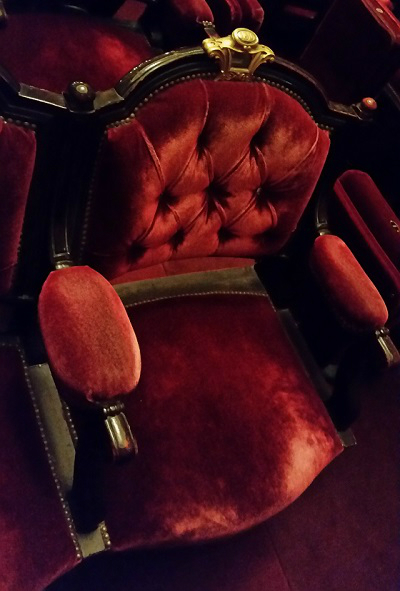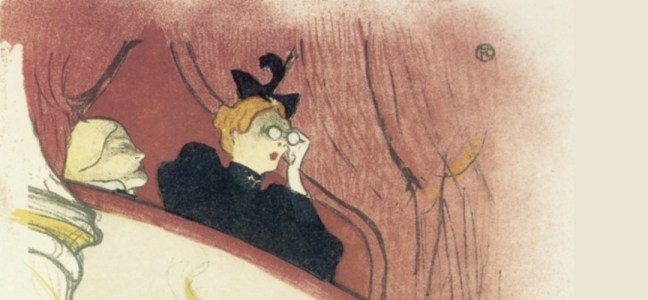
Eliogabalo is an opera written in 1667 by Francesco Cavalli, which was never performed until 1999, when the Teatro dell’opera di Crema decided to resurrect it. The style is pre-baroque, and also probably pre-Monteverdi, even if Cavalli was 30 years younger. It really sounds like “recitar cantando“: the characters talk to each other in interminable recitativi, which only rarely end up in an aria.
I’m sure most of you will think this is boring as hell, but what can I say, it has its charm. I truly enjoyed it. It is a different kind of enjoyment than the later operas, but I find the aesthetic of it extremely charming.
 The opera was performed at the Palais Garnier, and it was my first time there. Oh. My. God. This opera house is incredible. I had seen many pictures, but I just wasn’t ready for the opulence and the shameless luxury of this building. Even the chairs are like none I’ve ever seen: they don’t fold up, they are like old-fashioned armchairs, and they are very comfortable (you even get a little foot rest). There is the problem that if somebody needs to file in, and sit in a seat further in, getting up will not help at all: everybody in the whole row must get up, file out, let the late-comer in, and then file in again. A mess.
The opera was performed at the Palais Garnier, and it was my first time there. Oh. My. God. This opera house is incredible. I had seen many pictures, but I just wasn’t ready for the opulence and the shameless luxury of this building. Even the chairs are like none I’ve ever seen: they don’t fold up, they are like old-fashioned armchairs, and they are very comfortable (you even get a little foot rest). There is the problem that if somebody needs to file in, and sit in a seat further in, getting up will not help at all: everybody in the whole row must get up, file out, let the late-comer in, and then file in again. A mess.
The production was very visually striking. I had already seen the streaming a week ago, so I knew what to expect. It looks much better in the hall (also because the stupid director keeps cutting to close-ups which don’t give you any idea of what the staging looks like), but it’s not to everybody’s taste. I loved it. The costumes were extremely colorful and eccentric. My tweeps hated them, in the streaming, but I thought they were great!
The opera is a story based on Eliogabalo, an unbearable teenager who became emperor of the Roman empire at age 14 or something. He went wild. He was surrounding himself with hordes of boys and girls, on whom he was bestowing his favors, and spent enormous amounts of money in parties. Sex and drugs and rock&roll, like any teenager would. He ended up being killed at age 18 by his own guard, fed up with his extravagances.

So the opera tells the story of him pursuing different women, sexually assaulting several of them, planning the murder of their boyfriends and generally behaving like a debauched idiotic criminal. Franco Fagioli was absolutely marvelous in this part. He has a boyish look, and played the wild teenager with ease and panache. His voice is truly beautiful, and, in the few arias he got to sing, he really melted my heart. His extremely unusual and original voice is fascinating as ever. He has a good understanding of early music, and his interpretation was moving, despite the truly unlikable character.
Like any other very early opera, it was flooded with characters. The female lead was Nadine Sierra, singing the character of Flavia Gemmira, the main object of Eliogabalo’s lust. Sierra has a wonderful timbre, her voice is velvety and smooth, and her high notes are extremely confident. I truly liked her, and I want to hear more of her. Her command of the spoken word was remarkable, for a non-native speaker, and her character came out in 3D, much more than the others, I have to say.

Gemmira’s beloved, Alessandro (Eliogabalo’s cousin), was the tenor Paul Groves: a high, confident voice, an interpretation which came out a bit stiff, but again a strong command of the Italian language. His voice is big and the passaggio is nonexistent. I liked him a lot, and I would love to hear more of him.
Then we have another woman who Eliogabalo lusts for, and actually rapes, at the beginning of the opera. Eritea was sung by the soprano Elin Rombo, a voice thinner than Sierra’s, but very high and clear. Adequate, but not memorable.
Her boyfriend, the captain of Eliogabalo’s guard, Giuliano, was Valer Sabadus, a countertenor I have heard a lot about but I never got to hear live. His voice is that of a more “standard” countertenor, a bit weak, I’m afraid, and with quite a lot of metal, but without the harsh edges that many countertenors feature. He sang very well, and his character came through. I liked him, but I would not travel just to hear him.

Then we have a woman in love with Alessandro, Attilia, who was interpreted by Mariana Flores. Her voice is round and high, very flexible, but her interpretation was a bit non-memorable. She doesn’t have a big part, to be honest.
Eliogabalo has two servants/advisers who support all his crazy ideas, and suggest ways to bring his criminal plans to fruition. Matthew Newlin, a tenor, was Zotico. Good actor, his voice came out a bit in screaming waves, but always in tune. He’s on stage most of the time, but has no arias. The other adviser is the old wet-nurse, Lenia, sung by a man, as it was customary in early operas for the character of the old spinster, responsible for the comic relief (even Haendel has one of this characters in Giulio Cesare). The singer was Emiliano Gonzales Toro, and he did a very good job. Lenia has two or three arias which he pulled off really well. His acting was trying to be funny, but not in an annoying way, and overall his performance was one of the best.
The bass Scott Conner played Nerbulone (somebody Lenia lusts after) and Tiferne (a gladiator that Eliogabalo hires to kill Alessandro). Not much to tell, he’s good, but not extremely memorable.

The orchestra was Cappella Mediterranea, and they were fabulous!! A baroque orchestra, of course, with magnificent cornetti (instead of the trumpets). The continuo, with two theorbos, an archiluth, two viole da gamba, and a couple of harpsichords, were constantly at work, because the opera is mostly recitativi, and they did a fantastic job. The conductor Leonardo Garcia Alarcón doubled as harpsichord player, and managed to keep the music moving, never losing the pace. This is extremely important, in an opera with such a high probability of becoming boring as hell. He did a great job!
The opera ends with Eliogabalo trying to rape Flavia Gemmira and getting killed by his own soldiers, and his body being dismembered by an angry mob in the streets of Rome. The same angry mob lynches Zotico and Lenia, and crowns Alessandro as the next emperor. A quartet (or rather, a double duet) of the two reunited couples (Gemmira and Alessandro, and Giuliano and Eritea) follows, and it’s one of the best things of the whole opera. It closely resembles the duet at the end of L’incoronazione di Poppea, by Monteverdi, both in the text and in the musical realization. (This strongly suggests that the final duet in Poppea was in fact written by Cavalli, like many musicologists think.) The four singers were extremely good and moving, in this double duet, which is both emotional and very sensual.
A wonderful evening of early music, with a magnificent Fagioli, a great rest of the cast, and a spectacular orchestra.
